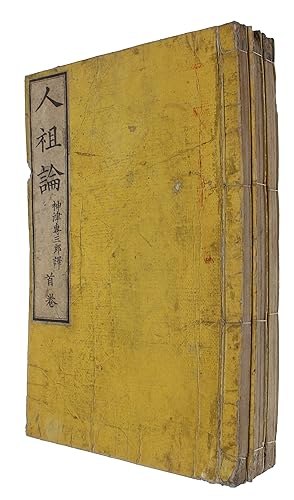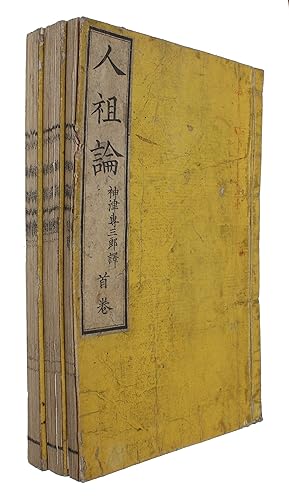About this Item
Tokyo, Ichibe Yamanaka., Meiji 14. (1881). 8vo. 3 volumes, all in the contemporary (original?) yellow wrappers (Traditional Fukuro Toji binding/wrappers). Extremities with wear and with light soiling, promarily affecting vol. 1. Title in brush and ink to text-block foot. A few ex-ownership stamps. Folding plate with repair. A fine set. 46 ff" 70 ff. + 9 plates of which 1 is folded" 72 ff. "Vol. I contains prefaces to 1st and 2d editions of Descent of man Nos 936 & 944" vol. II contains chapter 1 and vol. III chapter 2. All published, intended to form 9 vols containing chapters 1-7 and 21." (Darwin-Online). The exceedingly rare first translation of Darwin's Descent of Man and the first (partial) translation of Origin of Species, constituting the very first translation of any of Darwin's work into Japanese and, arguably, being the most influential - albeit in a different way than could be expected - of all Darwin-translations. "The first translation of a book by Darwin was published in 1881: a translation of The Descent of Man, titled as Jinsoron (On the Ancestor(s) of Man" Darwin 1881). The translator was a scholar of education, Kozu Senzaburo (.). In spite of its title, the book was actually a hybrid, which included a mixture of chapters of the Descent (namely, chapters 1-7 and 21) together with other texts: the Historical Sketch that Darwin appended to the third edition of the Origin (1861), and some sections taken from Thomas Huxley's Evidence as to Man's Place in Nature (Kaneko 2000). So this book can also be described as the first publication including a partial translation of a text from the Origin" (Taizo, Translating "natural selection" in Japanese: from "shizen tota" to "shizen sentaku", and back?)Darwin's theories had a profound influence on Japan and Japanese culture but in a slightly different way than in the West: Darwinism was marked as social and political principles primarily embraced by social thinkers, philosophers and politicians to advocate the superiority of Japanese culture and society (and military) and not by biologist and zoologist. "It was as if Darwin's famous oceanic journey and the meticulous research into the animal and plant kingdoms that he spent his life undertaking had all been staged as an elaborate excuse for composing a theory whose true object was Victorian society and the fate of the world's modern nations." (Golley, Darwinism in Japan: The Birth of Ecology).The popularity of Darwin's works and theories became immensly popular in Japan: "Curiously, there are more versions of "The Origin" in Japanese than in any other language. The earliest were literary, with subsequent translations becoming more scientific as the Japanese developed a technical language for biology." (Glick, The Comparatice Reception of Darwinism, P. XXII)Darwin's work had in Japan - as in the rest of the world - profound influence on the academic disciplines of zoology and biology, however, in Japan the most immediate influence was not on these subjects but on social thinkers: "[.] it exerted great influence on Japanese social thinkers and social activists. After learning of Darwin's theory, Hiroyuki Kato, the first president of Tokyo Imperial University, published his New Theory of Human Rights and advocated social evolution theory (social Darwinism), emphasizing the inevitable struggle for existence in human society. He criticized the burgeoning Freedom and People's right movement. Conversely Siusui Kautoku, a socialist and Japanese translator of the Communist Manifesto, wrote articles on Darwinism, such as "Darwin and Marx" (1904). In this and other articles, he criticized kato's theory on Social Darwinism, insisting that Darwinism does not contradict socialism. The well known anarchist, Sakae Osugi published the third translation of On the Origin of Species in 1914, and later his translation of peter Kropotokin's Mutial Aid: A Factor of Evolution. Osugi spread the idea of mutual aid as the philosophical base of Anarch. Seller Inventory # 60016
Contact seller
Report this item
![]()

